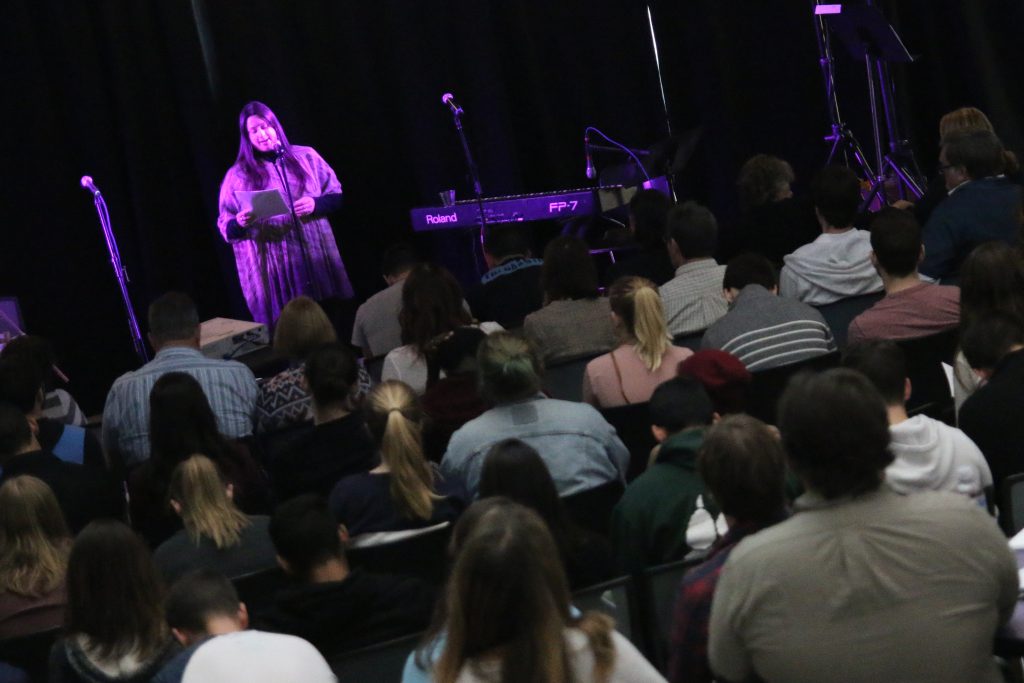
Poets separated by oceans came together to share their love of language and performance this weekend at Crossroads: The Fifth Binghamton International Poetry Festival.
The event was held at the atrium of University’s Downtown Center Saturday and hosted BU students, as well as poets from abroad.
In previous years, the event focused on the multilinguistic aspect of poetry. However, this year’s edition included fewer performers and a stronger focus on multimedia and multi-disciplinary pieces.
Event organizer Mario Moroni, a professor of Italian at BU, explained that while the different languages were important, he also wanted to see the theatrical features of each performer.
“We wanted to see what the poet [could] do beyond the printed page and beyond the traditional poetry reading,” Moroni said.
The festival warmed up with undergraduate and graduate students from the creative writing program at the University with the help of Joseph Weil, assistant professor of the English department, as a host.
Weil shared anecdotes about each of his students, whom he chose from his own undergraduate class, ENG 380W: American Hang Out. The class focuses on art movements and society, while also fostering creativity through painting, making instruments and writing poetry.
Weil’s enthusiasm and love for poetry and teaching was evident through his introductions of students.
“I want to help young poets,” Weil said. “If they catch fire, I love to preside over that. I like to catch somebody in the beginning.”
The guest poets, whose performances followed those of the students, had backgrounds in Portuguese, French, Yiddish, Persian and Italian, but united with universal themes in their writing.
Mahmood Karimi-Hakak, a poet, author, translator, film and theatre artist and professor of creative arts at Siena College, presented his works in English, although they were originally in Persian.
Despite his long experience of teaching and writing poetry, Karimi-Hakak asked one question that the other poets also had trouble answering.
“I still don’t know,” Karimi-Hakak asked. “What is poetry?”
With this idea, the poets presented their writings and tried to define and make sense of their own poetry.
“There is no answer to this question,” Moroni said. “That’s exactly why you keep doing it.”
Roberta Borger, a Ph.D. candidate student studying creative writing originally from Sao Paulo, Brazil, performed “the train.” This poem was performed in the rhythm of a train, which highlighted the performance aspect.
Because English is her second language, Borger admitted that she finds difficulty in speaking, but for writing, she has her own poetic approach.
“I think poetry is all about word choices, and finding the exact word to mean what you say,” Borger said.
Other guest poets, including Peter Fulton, Emily Vogel and Emily Skillings, used music, pictures and video to enhance their poetry messages and give the audience a sensory experience.
Poets Yvan Tetelbom and Moroni shared pieces in French and Italian, coupled with dramatic theatrical performances.
Moroni, accompanied by two fluent Italian speakers, portrayed confusion and distress in his pieces with call-and-response and repetition to enhance the audience’s understanding, despite the language barrier.
With the lack of a concrete definition for poetry, each poet found their own way of interpretation through performance, translation and images. However, their dedication to poetry brought the event together despite their differences in cultural background.
Jessica Femiani, a Ph.D. candidate studying English and creative writing, summarized the importance of such a cultural event.
“Language shapes us and it saves us,” Femiani said.


